A TRUE LEADER IS SOMEONE WITH A CLEAR VISION, WHO EFFECTIVELY COMMUNICATES IT TO OTHERS AND TRANSFORMS IT INTO REALITY.
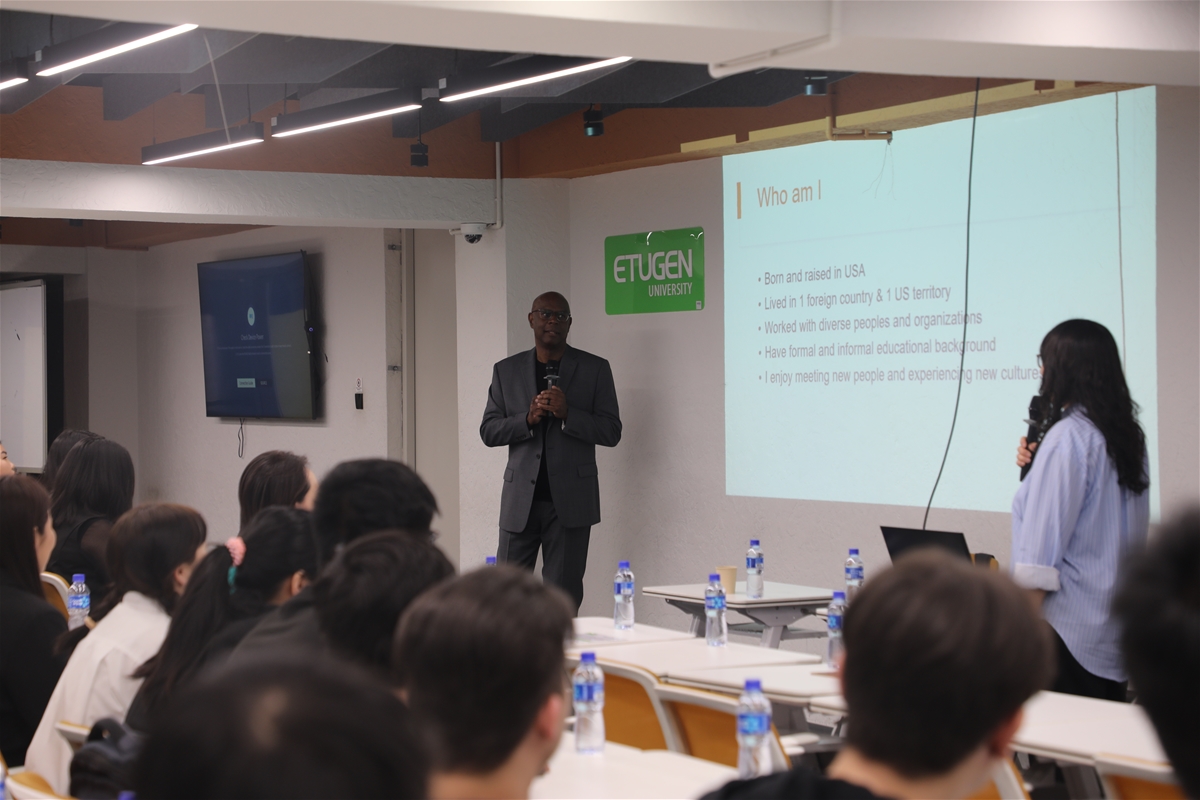
Dr. Anthony Beckham, a cross-cultural education specialist (PhD), holds a Master of Business Administration (MBA), a Bachelor of Science in Biology (BS), and is a board-certified coach. He has served at the following universities:
- School of Business and Public Leadership, Johnson University, TN, USA
- School of Graduate and Professional Studies, Vanguard University, CA, USA
- School of Global Entrepreneurship and ICT, Handong Global University, South Korea
- Sol International School, Woosong University, South Korea
At the invitation of the Office of International Relations and the Department of Business Administration under the School of Humanities at Etugen University, Dr. Beckham visited the university on March 25–26. During his visit, he conducted a series of meetings, lectures, and seminars for faculty members and students.
He led discussions and training sessions on topics such as "Blended Learning in Business Programs," "Evaluation and Outcomes of Business Programs," and "Social Leadership Impact" for Etugen University’s faculty, students, and alumni, contributing significantly to collaborative academic development.
SEMINAR ON "SOCIAL LEADERSHIP IMPACT"
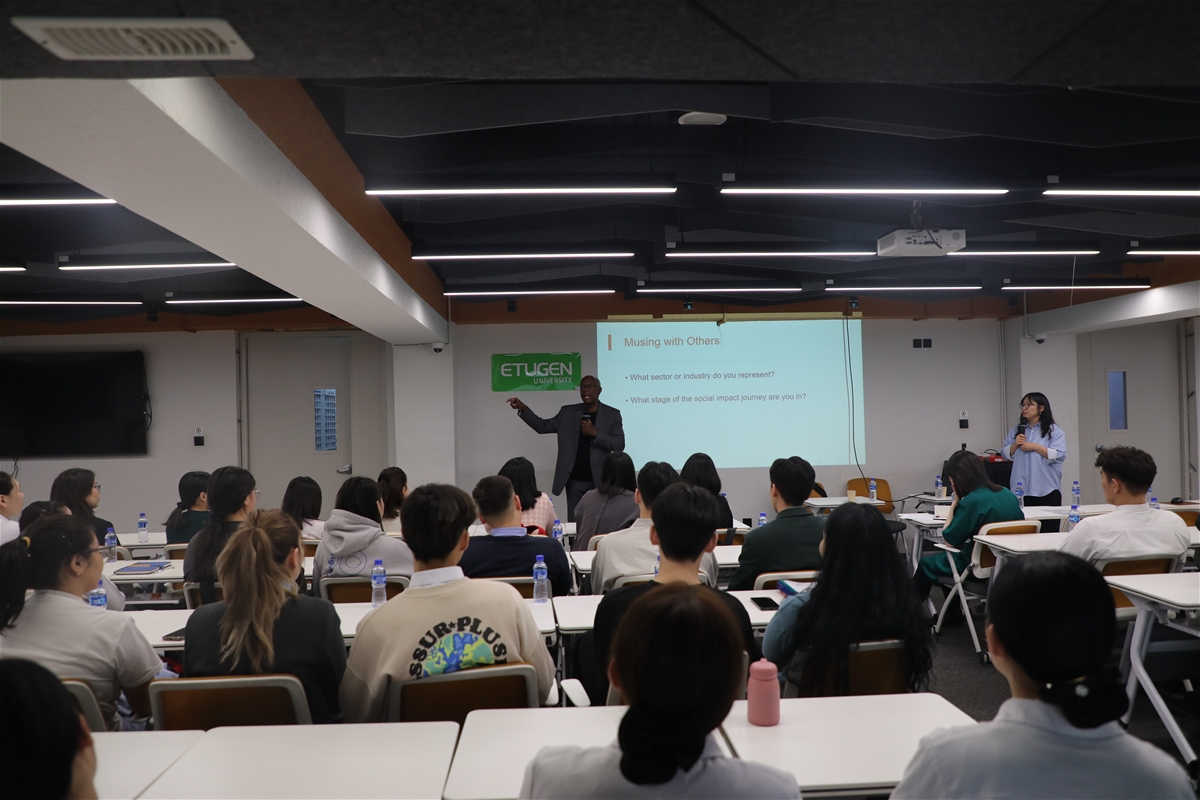
Dr. Anthony Beckham delivered a thought-provoking lecture on “Social Leadership,” not in a traditional one-way, speaker-centered format, but rather through an interactive, participant-centered approach. His goal was to engage faculty and students, encourage open dialogue, and create a space where everyone’s voice could be heard.
Sharing his personal background of growing up in the United States and his own educational journey, Dr. Beckham quickly captured the audience’s interest. By doing so, he broke down the perception of being a “foreigner” and instead fostered a sense of shared humanity, making the session both relatable and impactful.
Beyond defining the general characteristics of a leader, Dr. Beckham also introduced the concept of the “Nomadic Leader” a term he developed based on conversations with Mongolian individuals during his repeated visits to Mongolia over the past eight years. According to him, a true global leader is someone who possesses a dream, is able to transform that dream into a compelling vision, and can effectively communicate and implement it by inspiring others.
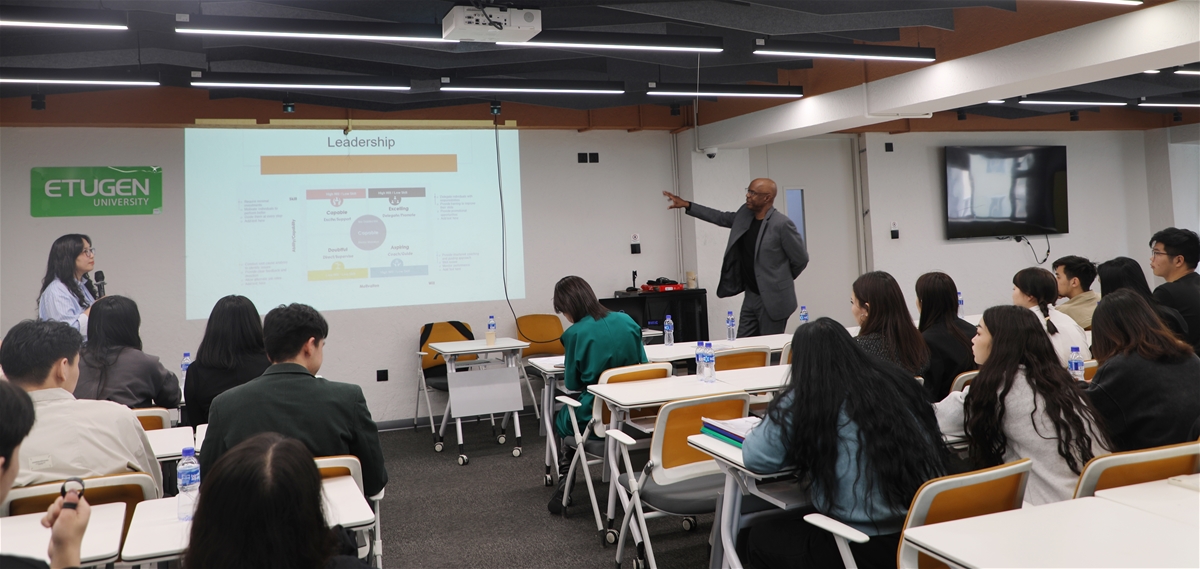
In contrast, the “Nomadic Leader,” as described through the common traits expressed by Mongolians themselves, is someone who is open-minded, curious, humble, eager to meet new people, enthusiastic about visiting unfamiliar places, receptive to new ideas, and constantly seeking and discovering new solutions.
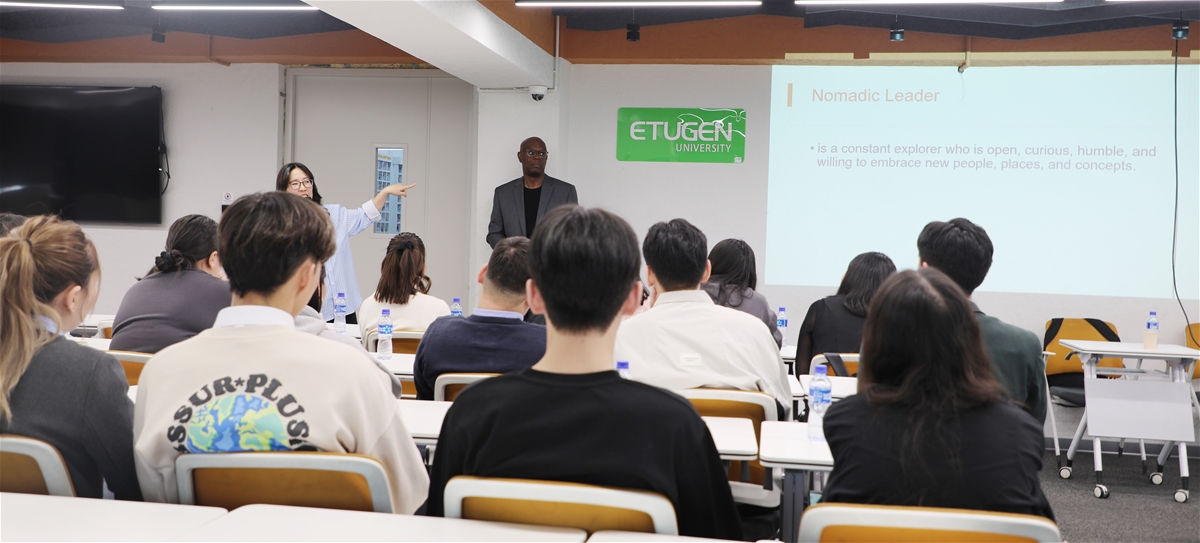
Dr. Beckham emphasized that leadership and management are fundamentally different concepts. While management is often associated with hierarchical authority and task execution, many global organizations make the mistake of promoting efficient task performers into leadership roles, failing to recognize the distinction between the two.
He posed the essential question: What truly defines a leader in society? A socially impactful leader, he explained, is someone who simultaneously considers four interconnected domains: purpose, people, planet, and prosperity.
In addition to this holistic perspective, he underlined the importance of adaptability: A true leader must be able to adjust their methods and approaches based on the context and needs of those they interact with. He warned that if a leader only has one communication style or method, it may be time for that leader to recognize the need for personal growth.
Ultimately, Dr. Beckham concluded that a leader must change themselves, not expect others to change for them. This, he noted, is the mindset of a leader who truly influences society.
Dr. Anthony Beckham highlighted that within the definition of a Nomadic Leader, one can clearly observe the presence of global-mindedness: openness to new people, new environments, and new ideas. This, he noted, suggests that Mongolian people inherently carry a spirit of innovation within their cultural DNA and inner nature.
To illustrate this point, Dr. Beckham turned to a student in the audience and asked, “Do you think you are a Nomadic Leader?” After attentively observing the student’s body language, he commented, “I noticed you first expressed, through your posture, the need to think about it. Then you looked at the definition, reflected on it, and said it could be a possibility. Thank you for taking a moment to reflect. When we receive brand-new information, our brains first process and evaluate it. This is because it takes time for the brain to decide whether it agrees or not. Understanding something is fundamentally different from agreeing with it,” he emphasized.
Reflecting on the conversation, Dr. Beckham observed that many people tend to filter new information based on whether they agree or disagree before they even try to understand it. But in truth, we have the capacity to first understand and only then decide whether we agree. “I know you may not agree with me,” he said, “but I would at least appreciate it if you first sought to understand what I’m trying to say.” According to him, those who can engage with others from this mindset are the ones who make a real impact as leaders in society.
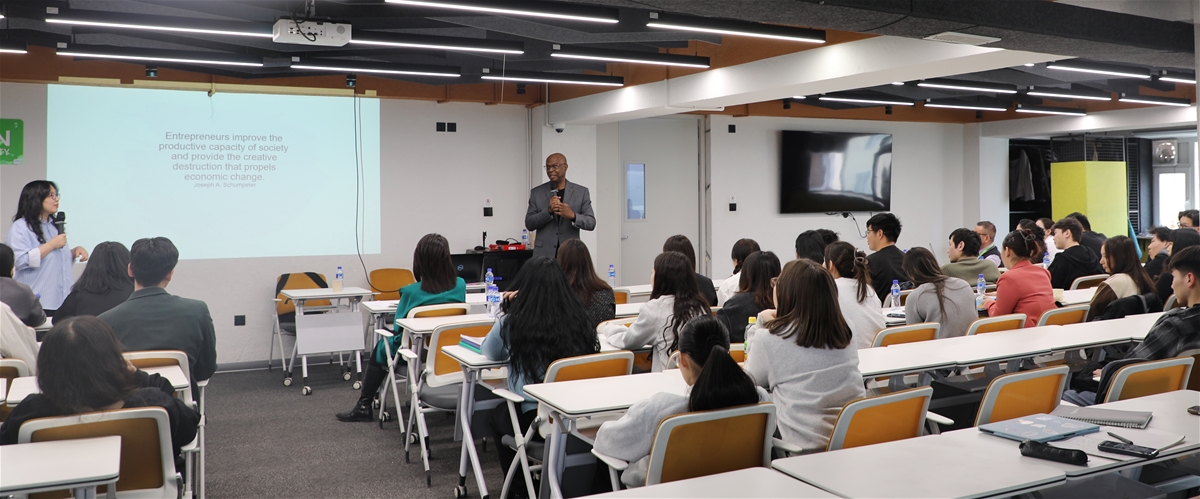
Dr. Beckham then challenged the students to reflect deeply on a critical question relevant to their current stage in life. He asked: “Even though you are students now, do you have a clear goal to contribute to the professional field you aim to enter after graduation? If so, what problems exist in that field? As a student, what solutions can you offer?”
By posing these questions, he encouraged the students to reflect on the purpose of their education and to approach their future careers with real-world awareness, creativity, and an innovative mindset.
He further emphasized that identifying problems and offering effective solutions requires engaging with people who think differently. Students should be willing to meet and exchange ideas with individuals from diverse backgrounds, professions, and personalities. Being open to stepping out of their comfort zones and learning from new perspectives, he suggested, is essential for developing meaningful solutions.
Quoting Albert Einstein, Dr. Beckham reminded the audience:
“We cannot solve our current problems with the same thinking we used when we created them.”
His goal was to help students gain a clearer understanding of what genuine problem-solving entails - a message that was both inspiring and deeply appreciated.
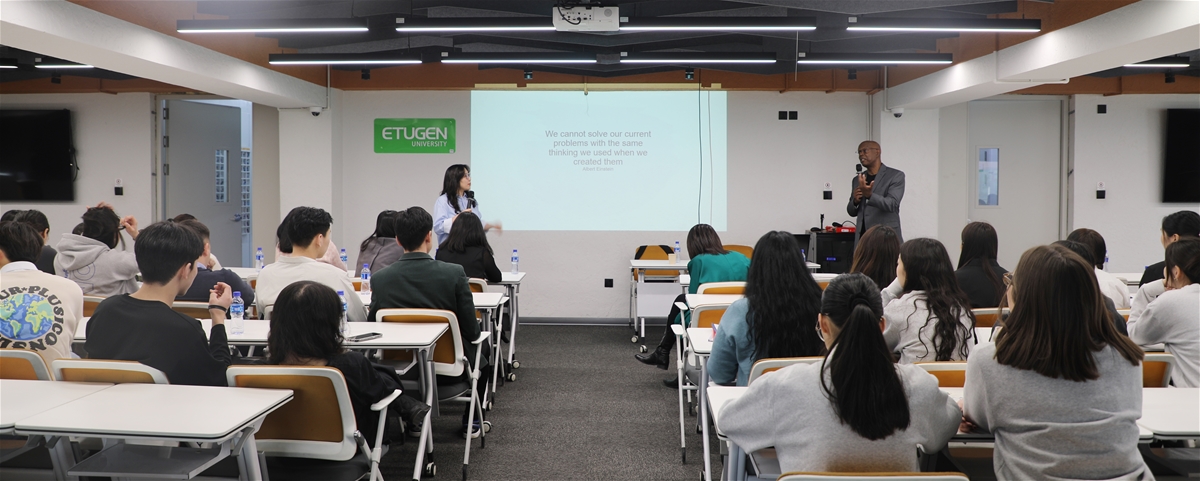
Since the concept of “solution” can remain theoretical without proper explanation, Dr. Beckham illustrated it vividly through several real-life examples tailored for the students. One notable example involved his advisory work through a company he established in Pennsylvania, where he provided consultancy to numerous startups, among them, the team that developed the popular language-learning app Duolingo.
This startup had identified a critical issue: In many parts of the world, particularly in developing countries people tend to perceive the quality of local education as relatively low. As a result, many aspire to study abroad and are eager to learn English to achieve that goal. Recognizing this need, the founders developed a cost-effective mobile application accessible worldwide via smartphones. This innovation turned a pressing need into a remarkable opportunity, becoming a brilliant solution.
As the company expanded, it eventually went public and listed its shares on the stock exchange. Today, Duolingo is a globally recognized and respected application. Naturally, such companies grow in stages, which Dr. Beckham briefly referred to as the business life cycle.
He noted that the students attending the talk may find themselves at any stage of this cycle, some might be uncertain about what they want to pursue, while others may already have a fully formed business idea in mind and are working day and night to bring it to life. Depending on the stage, different strategies are required, and he touched upon the importance of understanding that.
Most importantly, he emphasized that age is not a limiting factor when it comes to offering solutions whether you’re eight or eighty years old, you can come up with impactful solutions.
At the conclusion of his lecture, Dr. Beckham reminded the students: “Language proficiency alone doesn’t make someone a global citizen. It’s the art of communication that truly does.”
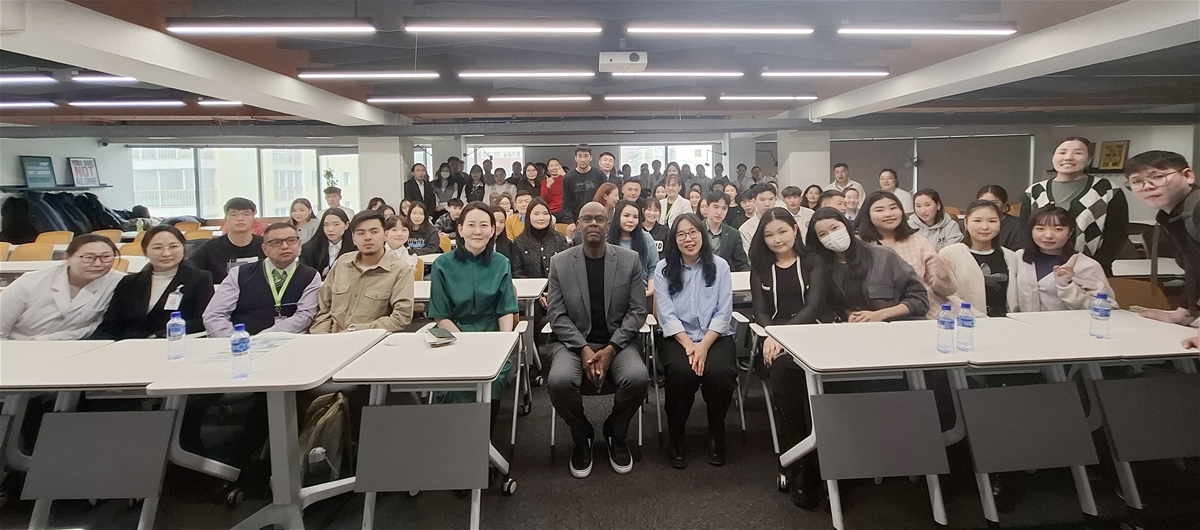
He stressed that communication is not confined to foreign languages even without advanced language skills, one can connect across cultures through body language, behavior, and attitude. He ended on an encouraging note:
“You have the qualities of Nomadic Leaders in your DNA, globally-minded and innovative individuals!”
International Relations Department
Etugen University
